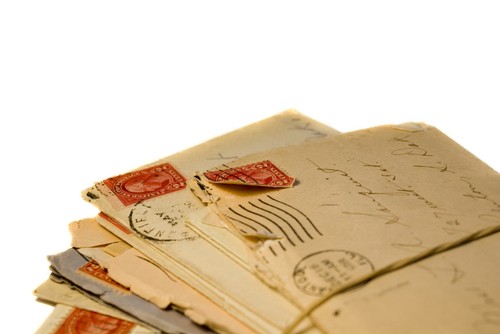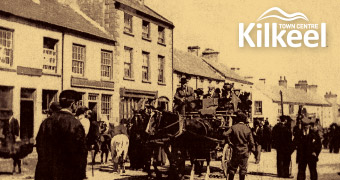Emigration was widespread in Ireland during the 1800s due to the promise of a better life on the other side of the Atlantic or further afield. The effects of emigration even effected small rural areas like Kilkeel, with sometimes entire families upping roots and leaving their homes to go to places like America and Australia. One family who left Ireland were the McDowell’s, moving to George Town in Carolina. Davison McDowell moved there with his mother and sister. Letters from Charles Lewis of Kilkeel to Davison give us a good insight into what it was like losing a friend to America and the ensuing curiosity about life in this far away land.
The postal service in the 1800s was nothing like it is today. It could take weeks or many months for the recipient to receive their letter, if they even got it at all. A lot could happen between the time a letter was written and received. Charles writes to his friend Davison telling him of the somewhat mundane happenings in his home land and enquires as to what kind of life America has to offer Irish emigrants; ‘beside that of being near your much esteemed self could you offer to a bachelor who might yet be among the emigrants of Ireland.’ Charles seems to be considering the option of emigration at the time of writing this letter. He wants to know what Davison’s ‘amusements’ are and how he was employed during the war.
The economic state of Ireland does not sound overly promising and local trade does not seem to be in good shape; ‘trade never was in my memory so dull as at present. Failures among our merchants [are] so common that hardly any are thought secure.’ The lack of employment and a fluctuating income was something which drove many people to emigrate. America promised abundant work to those who made it there. If times were hard in Kilkeel it would be difficult to find a reason to stay.
Charles misses his friend and suggests him coming home to visit, encouraging him by stating that ‘perhaps it is destined you are to meet that compassionate female you are in quest of this side of the Atlantic.’
On a lighter note Charles tells Davison some good news; ‘our young people here are increasing and the country in a good deal gayer. We have got a new ball room built in town and have had some pleasant dances this spring.’ Something as simple as a dance or a place to meet friends is enough to cheer people up. There probably was not much to do in a small town like Kilkeel in the 1800s. Charles tells Davison he met his old friend at one of the gatherings; ‘your dancing acquaintance Mr Cleland was with us this winter and we had some fine meetings which past some dreary nights’.
He then goes on to fill Davison in on the local happenings, updating him on people’s health and social lives. A Thomas Nicholson was nearly killed by a fall from his horse in Warrenpoint but had recovered. Mrs Bankhead was in bad health and Widow Trimble was in good health and spirits living alone which her son is at school.
Charles was sending the letter to New York by a Captain Curran, nephew to Mr Henry Curran, Glassdrummond. He was the ‘master’ of the ship Samuel and ‘is a very pleasant, decent fellow. He has been a good deal among his Mourne friends while in port and he gave them fine entertainment on board his ship. I was one of the party. We spent a very fine day in a social, jovial manner.’ Ships were the only form of long distance transport back in the 1800s and life at sea was a livelihood for many men. This ship sailed from Warrenpoint yet it is hard for us to imagine the hustle and bustle of the port, full of many people coming and going.
Charles is very curious about America, ‘I think I would like to hear more of America than I have even asked.’ He has to finish his letter however and doesn’t get a chance to ask any more questions as Captain Curran is sailing ‘tomorrow’ and he hoped to be at Warrenpoint before he departed so ‘I will bid you a good night at quarter past 12.’ Charles expected to hear back from Davison soon about the linen yarn which is apparently very cheap.
He closes his letter;
‘I remain with affectionate regard,
Your sincere friend,
Chas. Lewis’
The letter was addressed to;
Mr Davison McDowell
George Town
South Carolina
America
(Information from PRONI)



